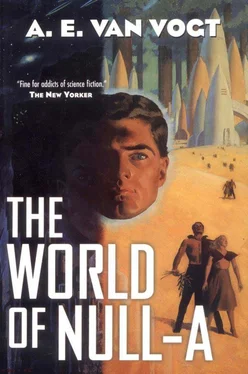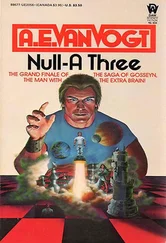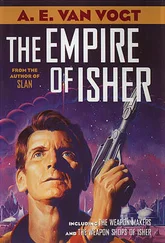It was the awkwardness of the fighting, the close-in awkwardness of it, that suddenly enlightened Gosseyn.
“My God,” he said, “is that fight going on in darkness?”
The question was rhetorical, for he could see now the difference between daylight and the daylight out there. This was a scene of the night taken by radaric cameras. From behind him, Thorson said thickly, “That's where all weapons fail. Darkness. Every man has a device for seeing in the night, but it takes power to operate it, and you have to fit it into place.” He moaned with anger. “It's enough to drive you mad, to watch those stupid fools acting like all the stupid soldiers that ever were.”
He raved on for another minute, then stopped. There was silence behind Gosseyn, and then Thorson spoke in a much calmer voice.
“What am I getting heated up about?” he said. “That attack took place the first night. It happened in every camp established by our soldiers. It was devastating, because no one expected unarmed hordes to attack one of the best equipped armies in the galaxy.”
Gosseyn scarcely heard. He watched the battle with utter fascination. The attackers now numbered thousands. Their dead lay sometimes three deep stretching from every tree. But they were not alone. Here and there in that overwhelmed camp galactic soldiers were still struggling.
Hand blasters still flashed with an occasional murderous thrust, but as often as not, now, the wielder was a Venusian null-A.
In ten minutes more, there was no doubt of the result. And army of determined men with clubs had seized a modern military camp with all its equipment.
As the victorious Venusians began to dig graves for the dead, Thorson reached over and switched off the video. The light in the apartment brightened. He glanced matter of factly at his watch.
“I've got less than an hour before Crang comes,” he said.
He stood for a moment, frowning, then motioned at the blank wall where the video scene had been so vividly pictured a moment before.
“Naturally,” he said, “we rushed in reinforcements and they made no attempt to attack cities. But that wasn't their purpose. They wanted weapons, and they got them. This is the fourth day of the invasion. As of this morning, more than twelve hundred of our spaceships have been captured and another thousand destroyed, countless weapons, have been seized and turned against us, and some two million of our men killed. To accomplish that the Venusians have lost ten million people-five million killed and another five million injured. But in my judgment their worst losses are over, whereas”–gloomily–“ours are just beginning.”
He paused in the center of the room. His eyes were sullen. He chewed his lower lip savagely. At last darkly: “Gosseyn, it's unheard of. There's never been anything like it in the history of the galaxy. Conquered people or nations, even whole planetary groups, remain at home and the great mass always submits. They may hate the conqueror for a few generations, but if the propaganda is handled right, soon they take pride in their membership in a great empire.” He shrugged, muttered half to himself, “The tactics are routine.”
Gosseyn was thinking, “Ten million Venusian casualties in less than four days.” The figure was so enormous that he closed his eyes. Slowly, then, and grimly, he opened them again. He felt a great pride and a great sorrow. The philosophy of null-A was justified, proved, honored by its dead. As one man, Venusians had realized the situation, and without agreement, with no pre-planning or warning, had done what was necessary. It was a victory for sanity that would surely leave its impress on every thoughtful man in the universe. Out there on the planets of other stars, men of good will must exist in very large numbers.
Gosseyn made an automatic estimate of how many billions of honest men there would be. The figures startled him, altered the flow of his thought. He stared at Thorson with narrowed eyes.
“Just a moment,” he said slowly. “What are you trying to put over? How could a galactic empire with more soldiers than there are people in the solar system be defeated in four days? Why shouldn't they be able to supply virtually endless armies and if necessary exterminate every null-A on Venus?”
The expression on Thorson's face was sardonic. “That,” he said, “was what I was talking about a little while ago.”
Without taking his gaze from Gosseyn's face, the big man drew up a chair and sat down astride it, leaning his elbows on the back. There was an intentness in his manner that left no doubt of the importance of what he was about to say. He spoke finally, softly.
“My friend, think of it this way. The Greatest Empire-that is a literal translation, by the way, of the original word-is a member of a Galactic League. The other members outnumber us three to one, but we are the largest single power that has ever existed in time and space. Nevertheless, because of our League obligations, we can act only within certain limitations. We are signatories to treaties which forbid the use of a Distorter as we used it against the Machine. The treaties forbid the use of atomic energy except as a source of power and for a few other specified purposes. We destroyed the Machine with atomic torpedoes. True, they were very small ones, but atomic nonetheless. In the League lexicon, the greatest crime of all is genocide. If you kill five per cent of a population, that's war. If you kill ten per cent, that's slaughter, and subject to indemnities if you are convicted before the League. If you kill twenty per cent or twenty million, whichever is the greater, that is genocide. If that is proved against you, the government of the power involved is declared outlaw, and all those responsible have to be delivered to the League for trial and execution, if convicted. An automatic state of war exists until the terms have been carried out.”
Thorson paused, a humorless smile on his face. Jerkily he climbed to his feet and paced the floor. He stopped finally.
“Perhaps you are beginning to realize the problem that the Venusians have created for us here. In another week, if we continue fighting, we will all be subject to extreme penalties, with an alternative of war on the vastest scale.”
His smile became grimmer. “Naturally,” he said, “we shall continue the war until I see my way clear in this situation. And that, my friend, is where you come in.”
The problem of himself came to the fore again as swiftly as that.
Gosseyn sank slowly back into his chair. He was puzzled, but he was suffering an emotional reaction that prevented thought. His body ached with anger and hatred for the galactic empire that was playing the game of power politics with human lives. He felt a consuming need to give of himself, to share in the great sacrifice that had been made, to offer his life as freely as others had offered theirs. The desire to be at one with the people of Venus was almost overpowering.
Almost. Consciously, cortically, he drew away from that death impulse. What was right for them was not necessarily right for him. It was the very essence of null-A that no two situations were the same. He was Gilbert Gosseyn II, possessor of the only extra brain in the universe. His purpose must be to remain alive and develop his special mind.
And that was what was puzzling here. Theoretically, there was no chance at all for a prisoner to accomplish any purpose of his own. But Thorson's very frankness seemed to offer hope.
Whatever it was, he would have to accept it and somehow turn it to his own advantage.
He saw that Thorson was still staring down at him, a somber expression on his face now. The big man said slowly, “What I don't understand, Gosseyn, is where do you fit into this picture?”
Читать дальше










